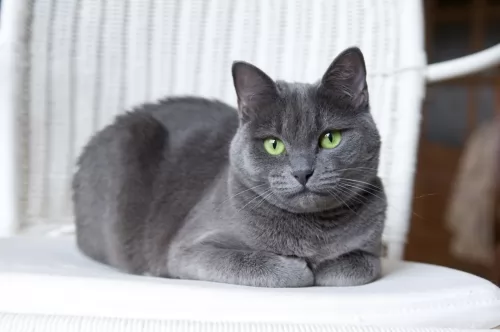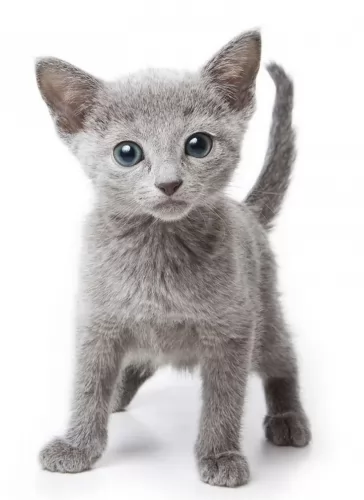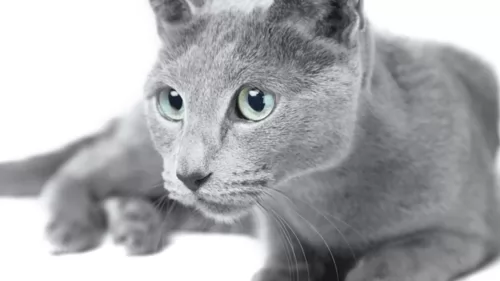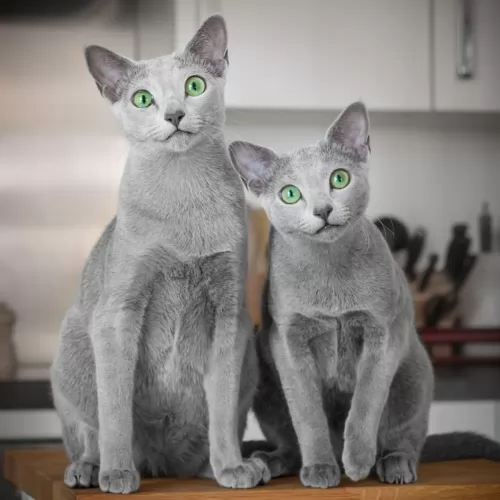 Petzlover
PetzloverRussian Blue is originated from Russia but Selkirk Rex is originated from United States. Both Russian Blue and Selkirk Rex are of same weight. Russian Blue may live 3 years more than Selkirk Rex. Both Russian Blue and Selkirk Rex has same litter size. Russian Blue requires Low Maintenance. But Selkirk Rex requires Moderate Maintenance
 It is believed that this beautiful cat originates from Russia, and more specifically the Archangel Isles.
It is believed that this beautiful cat originates from Russia, and more specifically the Archangel Isles.
It is also thought that these cats descended from cats that were kept by the Russian Czars and that they arrived in England and Northern Europe during the 1860s. It appeared in cat shows and by 1912 it was given its own classification.
The cat was also introduced to the United States in the early 1900s and today it is a popular domesticated pet.
The Selkirk Rex originated in the USA in 1987. A host of cats have been used to develop this cat breed – Persians, British Shorthairs, Himalayans, American Shorthairs, Exotic Shorthairs, and others.
There was a litter of kittens and the odd one out, one with an unusual coat – was placed with the breeder, Jeri Newman, who bred the cat with a black Persian.
Three Selkirk Rex kittens were born as well as three straight-haired kittens. The cat has been developed with either long- or short coats. The Selkirk Rex cat breed is recognized by various cat associations such as the International Cat Association, the American Cat Fanciers Association in the 1990s as well as the Cat Fanciers Association in 2000.
 The medium-sized Russian blue cat is slender, strong, and muscular with long legs. He can weigh between 3 and 6kg.
The medium-sized Russian blue cat is slender, strong, and muscular with long legs. He can weigh between 3 and 6kg.
He has a beautiful blue, soft double coat that is short and thick. The coat is an even color with silver tips. What is an attractive feature of this cat too is that his double coat doesn’t shed much. The cat has a triangular-shaped head with yellow to green eyes.
The Russian Blue is such an amicable, sweet-tempered cat that likes nothing more than to be in the company of his human owners, He is calm and independent. They do well living with their human families but they do tend to form a deep bond with that one special person.
He will even follow his owner everywhere and is a loving, loyal companion. The Russian Blue is a social cat but also enjoys some quiet time out just to chill. He also isn’t too fond of visitors and may run away and hide if the occasion becomes too large and noisy.
This is a cat that will miss you when you’re at work all day but he is able to quietly wait for your arrival back home. Then he will appreciate some playtime.
The Selkirk Rex is a medium- to large-sized cat that will weigh between 3 to 6kg. He is a well-built cat of which you get a short- and long coat variety. The coat is available in all colors. The coat has a soft, woolly look to it with some curls.
With the long-haired variety, the cat has a well-plumed tail. One drawback perhaps is that the cat is a fairly heavy shedder, and perhaps wouldn’t be a good choice for those with allergies.
This is a lively, playful, energetic cat with a friendly temperament. Cat experts will tell you that it is the Persian and British Shorthair ancestors that have given him his placid, lovable nature. He is, however, more active than those cat breeds and loves to play.
Tolerant and affectionate, the Selkirk isn't a lap cat. Because he has a sociable nature, he dislikes being left alone for long periods of time.
The Selkirk Rex fits in well with households where there are well-behaved children and other pets. He is such a loving cat and loves to be in the company of his human companions. He isn’t demanding and likes to talk to you in a quiet voice.
 Your Russian Blue is such an intelligent cat and for this reason, when you bring one into your home, you’ll need to provide him with lots of stimulating toys and fun play times.
Your Russian Blue is such an intelligent cat and for this reason, when you bring one into your home, you’ll need to provide him with lots of stimulating toys and fun play times.
This is also a low maintenance cat and a brush once a week will be all that is required.
These are cats that love their mealtimes and you’ll want to work out a special eating program to ensure he gets all the nutrition he needs without over-eating.
Respond with lots of love and attention to your vocal Russian Blue, and you’ll soon see what a precious jewel this cat is as a companion and friend.
When you welcome a Selkirk Rex cat into your home, you’ll have a loving friend and companion.
They love to bask in the attention they get as they’re quite unusual with their wavy to curly coats. People are always wanting to touch it.
The Selkirk Rex cat is an active, playful cat and has a whole lot of love to offer you.
 Because the Russian Blue is a naturally occurring breed, they are fairly healthy cats. Watch out for obesity and urinary tract infections with your cat.
Because the Russian Blue is a naturally occurring breed, they are fairly healthy cats. Watch out for obesity and urinary tract infections with your cat.
Obesity shortens a cat’s life. It puts extra pressure on the cat’s joints and it makes them more likely to develop disease. Then again, it is dangerous to suddenly put your obese cat on a strict diet so that he loses weight too quickly.
Your cat requires a gradual decrease in body weight. If you’re worried about your cat’s weight, rather speak to a veterinary surgeon who can explain to you and also draw up a weight loss program for your cat.
Remember too, that cats are carnivores and they simply have to have meat in their diet. Commercially manufactured cat foods of the highest quality are high in protein and low in carbohydrates.
Feline lower urinary tract disease is no joke for a cat. This disease affects your pet’s lower urinary tract – the bladder. Causes include bladder stones or bladder infections and inflammation in the urinary bladder.
You may notice your cat battling to urinate. Your cat will also no doubt cry out while trying to urinate and this is because the process is so painful. There may also be blood in the urine.
You may notice that your cat isn’t using his litter box but urinating elsewhere. Your cat will need to get to the vet as soon as possible. It may not be a life-threatening disease but it can be highly uncomfortable for your cat.
The Selkirk Rex cat, if looked after well and given excellent food can live to be 15, 16, or 17 years of age. Some of these cats can suffer from hair loss. Remember, that every cat will require vaccinations and de-worming.
Chronic kidney failure usually develops over a number of months. Chronic kidney failure in cats is a progressive illness but if you get your cat to the vet it can be managed. The vet will want a sample of your cat's urine and possibly a blood test.
 The Russian Blue’s beautiful blue coat is short and thick and will do well with a brush once a week. The cat just thrives on the attention during brush time too.
The Russian Blue’s beautiful blue coat is short and thick and will do well with a brush once a week. The cat just thrives on the attention during brush time too.
Trim your Russian blue’s nails regularly.
Provide your cat with everything he needs to make his life pleasant. Food and water bowls, a litter box, a collar and tag, a nice soft bed, grooming accessories, climbing tree, and a scratching post.
Make sure he has his cat vaccines and is treated for parasites.
Your Selkirk Rex will need to have his fur brushed. You don’t want to brush him too hard every week as this can cause the curls to frizz. Rather use a spray bottle with some cat conditioner and lightly spray the curls and use your fingers to ‘comb’ his hair.
Provide your cat with well-balanced meals. Your Selkirk Rex is a carnivore and you have to ensure that his food is made up of meat. The best commercially manufactured cat foods know how to correctly balance your cat’s food so that it gets the perfect blend of vitamins and minerals. Always choose a good brand of cat food that will meet your cat's nutritional needs. If you’re unsure, you can always ask your vet for suggestions about good quality food that will help towards ensuring good health for your cat.
The cheaper, unknown brands may not have the best ingredients to keep your cat happy and healthy. Remember to read the labels as a growing kitten will require different food to a senior cat.
Provide your Selkirk Rex with a litter box, scratching post, and a climbing tree.
Your kitten will need to be vaccinated to protect him from some of the life-threatening diseases cats can get. Most of the vets these days recommend a combined vaccine, starting at about 8 weeks of age. These vaccines will protect your kitten from Feline Leukaemia Virus, Feline Parovirus, and cat flu.